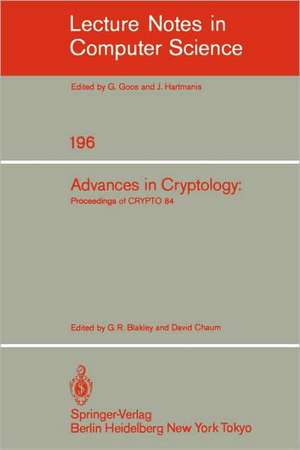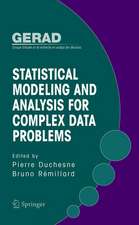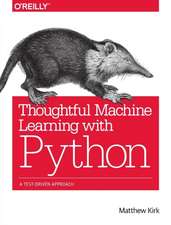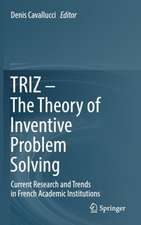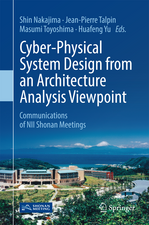Advances in Cryptology: Proceedings of CRYPTO '84: Lecture Notes in Computer Science, cartea 196
Editat de G.R. Blakely, D. Chaumen Limba Engleză Paperback – iul 1985
Din seria Lecture Notes in Computer Science
- 20%
 Preț: 1061.55 lei
Preț: 1061.55 lei - 20%
 Preț: 307.71 lei
Preț: 307.71 lei - 20%
 Preț: 438.69 lei
Preț: 438.69 lei - 20%
 Preț: 645.28 lei
Preț: 645.28 lei -
 Preț: 410.88 lei
Preț: 410.88 lei - 15%
 Preț: 580.46 lei
Preț: 580.46 lei - 17%
 Preț: 427.22 lei
Preț: 427.22 lei - 20%
 Preț: 596.46 lei
Preț: 596.46 lei -
 Preț: 381.21 lei
Preț: 381.21 lei - 20%
 Preț: 353.50 lei
Preț: 353.50 lei - 20%
 Preț: 1414.79 lei
Preț: 1414.79 lei - 20%
 Preț: 309.90 lei
Preț: 309.90 lei - 20%
 Preț: 583.40 lei
Preț: 583.40 lei - 20%
 Preț: 1075.26 lei
Preț: 1075.26 lei - 20%
 Preț: 310.26 lei
Preț: 310.26 lei - 20%
 Preț: 655.02 lei
Preț: 655.02 lei - 20%
 Preț: 580.93 lei
Preț: 580.93 lei - 20%
 Preț: 340.32 lei
Preț: 340.32 lei - 15%
 Preț: 438.59 lei
Preț: 438.59 lei - 20%
 Preț: 591.51 lei
Preț: 591.51 lei - 20%
 Preț: 649.49 lei
Preț: 649.49 lei - 20%
 Preț: 337.00 lei
Preț: 337.00 lei -
 Preț: 449.57 lei
Preț: 449.57 lei - 20%
 Preț: 607.39 lei
Preț: 607.39 lei - 20%
 Preț: 1024.44 lei
Preț: 1024.44 lei - 20%
 Preț: 579.30 lei
Preț: 579.30 lei - 20%
 Preț: 763.23 lei
Preț: 763.23 lei - 20%
 Preț: 453.32 lei
Preț: 453.32 lei - 20%
 Preț: 575.48 lei
Preț: 575.48 lei - 20%
 Preț: 585.88 lei
Preț: 585.88 lei - 20%
 Preț: 825.93 lei
Preț: 825.93 lei - 20%
 Preț: 763.23 lei
Preț: 763.23 lei - 17%
 Preț: 360.19 lei
Preț: 360.19 lei - 20%
 Preț: 1183.14 lei
Preț: 1183.14 lei - 20%
 Preț: 340.32 lei
Preț: 340.32 lei - 20%
 Preț: 504.57 lei
Preț: 504.57 lei - 20%
 Preț: 369.12 lei
Preț: 369.12 lei - 20%
 Preț: 583.40 lei
Preț: 583.40 lei - 20%
 Preț: 343.62 lei
Preț: 343.62 lei - 20%
 Preț: 350.21 lei
Preț: 350.21 lei - 20%
 Preț: 764.89 lei
Preț: 764.89 lei - 20%
 Preț: 583.40 lei
Preț: 583.40 lei -
 Preț: 389.48 lei
Preț: 389.48 lei - 20%
 Preț: 341.95 lei
Preț: 341.95 lei - 20%
 Preț: 238.01 lei
Preț: 238.01 lei - 20%
 Preț: 538.29 lei
Preț: 538.29 lei
Preț: 342.78 lei
Preț vechi: 428.48 lei
-20% Nou
Puncte Express: 514
Preț estimativ în valută:
65.59€ • 67.67$ • 54.74£
65.59€ • 67.67$ • 54.74£
Carte tipărită la comandă
Livrare economică 27 martie-10 aprilie
Preluare comenzi: 021 569.72.76
Specificații
ISBN-13: 9783540156581
ISBN-10: 3540156585
Pagini: 508
Ilustrații: XII, 496 p.
Dimensiuni: 155 x 235 x 27 mm
Greutate: 0.7 kg
Ediția:1985
Editura: Springer Berlin, Heidelberg
Colecția Springer
Seria Lecture Notes in Computer Science
Locul publicării:Berlin, Heidelberg, Germany
ISBN-10: 3540156585
Pagini: 508
Ilustrații: XII, 496 p.
Dimensiuni: 155 x 235 x 27 mm
Greutate: 0.7 kg
Ediția:1985
Editura: Springer Berlin, Heidelberg
Colecția Springer
Seria Lecture Notes in Computer Science
Locul publicării:Berlin, Heidelberg, Germany
Public țintă
ResearchCuprins
Public Key Cryptosystems and Signatures.- A Prototype Encryption System Using Public Key.- A Public Key Cryptosystem and a Signature Scheme Based on Discrete Logarithms.- A Public-Key Cryptosystem Based on the Word Problem.- Efficient Signature Schemes Based on Polynomial Equations (preliminary version).- Identity-Based Cryptosystems and Signature Schemes.- A Knapsack Type Public Key Cryptosystem Based On Arithmetic in Finite Fields (preliminary draft).- Some Public-Key Crypto-Functions as Intractable as Factorization.- Cryptosystems and Other Hard Problems.- Computing Logarithms in GF (2n).- Wyner’s Analog Encryption Scheme: Results of a Simulation.- On Rotation Group and Encryption of Analog Signals.- The History of Book Ciphers.- An Update on Factorization at Sandia National Laboratories.- An LSI Digital Encryption Processor (DEP).- Efficient hardware and software implementations for the DES.- Efficient hardware implementation of the DES.- A Self-Synchronizing Cascaded Cipher System with Dynamic Control of Error Propagation.- Randomness and Its Concomitants.- Efficient and Secure Pseudo-Random Number Generation (Extended Abstract).- An LSI Random Number Generator (RNG).- Generalized Linear Threshold Scheme.- Security of Ramp Schemes.- A Fast Pseudo Random Permutation Generator With Applications to Cryptology.- On the Cryptographic Applications of Random Functions (Extended Abstract).- An Efficient Probabilistic Public-Key Encryption Scheme Which Hides All Partial Information.- Analysis and Cryptanalysis.- RSA/Rabin least significant bits are secure (Extended Abstract).- Information Theory without the Finiteness Assumption, I: Cryptosystems as Group-Theoretic Objects.- Cryptanalysis of Adfgvx Encipherment Systems.- Breaking Iterated Knapsacks.- Dependence ofoutput on input in DES: Small avalanche characteristics.- Des has no Per Round Linear Factors.- Protocols and Authentication.- A Message Authenticator Algorithm Suitable for a Mainframe Computer.- Key Management for Secure Electronic Funds Transfer in a Retail Environment.- Authentication Theory/Coding Theory.- New Secret Codes Can Prevent a Computerized Big Brother.- Fair Exchange of Secrets (extended abstract).- Cryptoprotocols: Subscription to a Public Key, The Secret Blocking and The Multi-Player Mental Poker Game (extended abstract).- Poker Protocols.- Impromptu Talks.- A “Paradoxical” Solution to The Signature Problem.- Sequence Complexity as a Test for Cryptographic Systems.- An Update on Quantum Cryptography.- How to Keep a Secret Alive.
